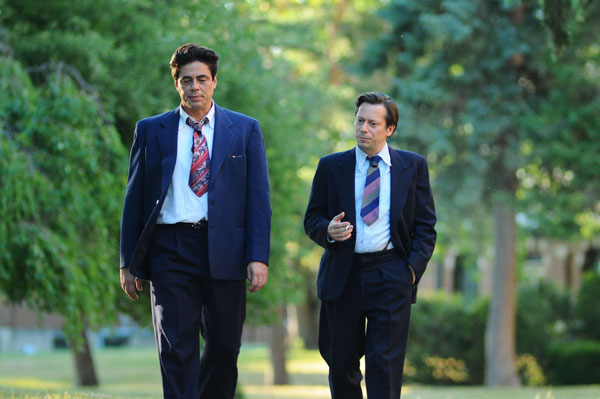“Something’s ailing Benicio Del Toro‘s title character in Jimmy P. (Psychotherapy of a Plains Indian),” begins Guy Lodge at In Contention, “but let’s lay that to one side for now. More pressingly, what is up with Arnaud Desplechin? The French writer-director is typically one of his country’s liveliest talents, with big, crowded, unapologetically chaotic films like A Christmas Tale and Kings and Queen bristling with emotional and intellectual curiosity—but he’s come a cropper in this lethargic, self-important psychiatry study, which he himself seems to have directed from the couch.”
This is “the Cannes competition’s wackiest, crappiest contender yet,” agrees the Guardian‘s Catherine Shoard, and we’ll come back to her in a moment, but first we need to note that the film does have its champions. For Variety‘s Scott Foundas, for example, Jimmy P. is a “profoundly Freudian study of loss and healing in post-WWII America, as seen through the experience of a dynamic shrink and his prize Native American patient. Largely a two-hander for stars Benicio Del Toro and Mathieu Amalric, both working at the top of their craft, this demanding but highly absorbing closeup on the analyst/analysand relationship seems sure to earn a warmer reception than the iconoclastic French auteur’s previous foray into English-lingo period filmmaking (with 2000’s unfairly maligned Esther Kahn)…. Sporting one of the more unusual literary sources ever adapted into a feature film, the pic draws its inspiration from Reality and Dream, a book-length case study by the ethnologist and psychoanalyst George Devereux (played by Amalric) about his treatment of one James Picard (Del Toro), a Blackfoot Indian whom Devereux encountered at Topeka’s famed Menninger Clinic in 1948. But as adapted by Desplechin, together with co-screenwriters Julie Peyr and Kent Jones, Jimmy P. constantly searches for—and finds—cinematic equivalents for Devereux’s clinical language.”
The Hollywood Reporter‘s Deborah Young particularly admires “Mathieu Amalric’s manic portrait of Devereau, who is shown as an ideal combination of anthropologist and psychoanalyst. Having lived among the Mohave Indians and learned their language and history, he is enthusiastic and curious about the customs of Jimmy’s tribe. Also, he’s the analyst everyone dreams of—penetrating, sympathetic, every word a direct hit. For once the dreary, cinematically overused drama of transference takes a back seat to pure intellectual detective work as he sets up a relaxed dialogue with his patient.”
But Shoard “can only hope [this] will go down as his worst ever turn. With the goggle-glasses and endless, inexplicable ebullience, it’s less a performance than an audition for some Saturday Night Live skit. Early on he has a slapstick cold you’re fully expecting to be exposed as a front for a chronic coke habit. But no, like so much in the film, it disappears as abruptly as it began. Scenes have a habit of stopping at any second, with or without whopping soundtrack… For what it’s worth, Del Toro—though he does look inescapably Hispanic—emerges with a few shreds of dignity. But perhaps it’s simply the sympathy talking; that brow-clutching and groaning and desperate sweating does mirror audience experience. ‘How much longer do I have to stay here?’ he enquires of a nurse at one point. You ask her, Jim, ask for us all.”
More from Mark Adams (Screen; “a film of subtle understatement”), Kevin Jagernauth (Playlist, C; “Desplechin falls short”), and Fabien Lemercier (Cineuropa; “Desplechin opens up new horizons”). The festival’s posted a recording of the press conference. And Worldview Entertainment has picked up US rights, reports Variety‘s Dave McNary.
Updates: “I’ve long maintained that nothing kills a movie faster than onscreen therapy (since cinema is inherently therapeutic, catharsis in motion),” writes Mike D’Angelo at the AV Club, “and Jimmy P. is almost nothing but an endless series of expository conversations that serve mostly as a contrast in mannered acting styles. Del Toro (who is not, to the best of my knowledge, a Native American) plays Jimmy with a nearly catatonic lack of affect, which forces Amalric to compensate with hammy, birdlike twitches; I spent much of the film wishing I could somehow shove them together to create a single credible human being…. At their best, Desplechin’s films exude a sense of mystery and wonder; the only mystery here is what attracted him to this woefully un-cinematic material.”
“It meanders along,” sighs Geoff Andrew in Time Out, “often feeling a little inconsequential but somehow managing to remain interesting throughout. Though some scenes involving Gina McKee as Devereux’s English lover seem almost tacked on, the two lead performances are basically so sympathetic that it’s impossible not to share the anthropologist’s concern for Picard’s well being.”
But for David Jenkins at Little White Lies: “There’s not even any kind of interesting conflict between the two leads—if anything they never feel more than entirely distant. Maybe that’s the point of the film?… It occasionally touches on the politics of the era, suggesting that Jimmy’s ailments might be the product of a the malaise experienced by the entire American Indian nation, but like so much else here, the idea is just dropped in there and allowed to float off into the darkness.”
Fabien Lemercier interviews Desplechin for Cineuropa.
Updates, 5/19: “At first glance,” Jimmy P. “seems simplistically straightforward,” grants Time Out New York‘s Keith Uhlich. “All chat, little texture. What you see is what you get. But therein lies the film’s complexity.” He suggests “that the character’s subconscious is under attack—dragged violently into a superficial world where it can be studied, picked apart and ultimately obliterated. A genocide perpetrated on a nerve-jangled native by an overeager foreigner under the sway of patronizing American masters. Read this way, Del Toro and Amalric’s one-note performances (the former resignedly shellshocked, the latter agitatedly servile) suddenly take on an anguished grandeur.”
But for Barbara Scharres, writing for RogerEbert.com, “a very strange amalgam of well-intentioned bio-pic, buddy-bonding drama, and misconceived off-kilter comedy.”
Updates, 5/22: Kent Jones, who worked with Desplechin on the screenplay, is also deputy editor of Film Comment and takes part in the magazine’s roundtable discussion of the festival at the halfway point (“five days in, five days to go”). At any rate, Jones remarks: “Most of the time when you see psychoanalysis on screen, you’re seeing parodies of psychoanalysis, like in a Paul Mazursky movie, or even in Bresson’s The Devil, Probably. Then, on the other hand, you have psychoanalysis as some kind of a dramatic machine, as in Ordinary People: you have the breakthrough, that’s the end of the story, and everyone gets to go home.” But Devereux “says to Jimmy: ‘Relapses are good. Don’t worry about relapses. Life will keep happening to you.'”
Writing for Paste, Tim Grierson suggests that “while a clinical approach doesn’t disqualify a movie from being riveting, the straightforward, unflashy style can sometimes be draggy rather than revelatory or engrossing.”
“This is a superb, engrossing picture, strange in all the right ways, and I long to see it again,” writes the Voice‘s Stephanie Zacharek.
Tom Christie at Thompson on Hollywood: “I found the film itself quite strange, the imagery flat, the editing choppy, many of the performances unconvincing, some of the relationships unsatisfying.”
Update, 5/31: Jordan Hoffman at Film.com: “So Desplechin at some point learned about this and said, ‘Yes! I will be the one to bring this fantastic tale to the screen!’ Only, there’s just nothing there.”
Cannes 2013 Index. And you can watch over 100 films that have seen their premieres in Cannes right here on Fandor. For news and tips throughout the day every day, follow @KeyframeDaily on Twitter and/or the RSS feed. Get Keyframe Daily in your inbox by signing in at fandor.com/daily.






